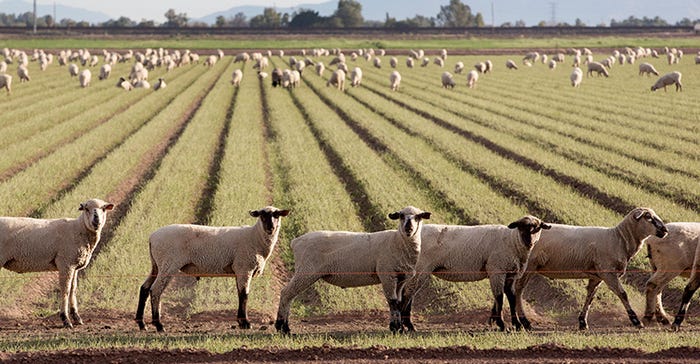What natural and organic leaders want from the 2023 Farm BillWhat natural and organic leaders want from the 2023 Farm Bill
Knowing the legislation has wide-ranging effects on farmers, brands and retailers, industry stakeholders are working hard to advance key initiatives.

Plant-based brands seek expanded support for crop diversity, plus the addition of plant milks to school lunch programs. Companies making organic dairy products desire a stronger commitment to organic grains for feed. Supplement brands would like more education about regenerative agriculture. Organic wineries want crop insurance improved. And stakeholders throughout the natural and organic food industry are lobbying for boosted budgets for organic research and standards protection.
All of these aspirations revolve around the 2023 Farm Bill, a massive piece of federal legislation that emerges about every five years. The Farm Bill governs a diversity of agricultural and food programs, including many that impact the natural and organic products industry. The Farm Bill makes a huge difference for farmers, brands, retailers and consumers. For example, the last one, in 2018, legalized hemp, so we can thank it for unleashing CBD upon the commercial landscape.
This pivotal piece of legislation dominates the lives of organic and natural industry professionals long before negotiations pick up steam. And now, as work on the next Farm Bill enters the final lap before a projected December release, industry stakeholders are focused on achieving key goals that would benefit everybody from herb farmers to veggie burger brands to regional natural retailer chains. Consumers too.
“The Farm Bill is the most important food legislation that Congress will consider next year,” says Kate Good, spokesperson for the Plant Based Food Association (PBFA). “It is our top legislative priority in 2023.”

Establishing markets for farmers
As the plant-based food industry continues its rapid expansion, following up record growth in 2020 with 6.2% growth in 2021 and $7.4 billion in sales, according data from PBFA, The Good Food Institute and SPINS, demand for new proteins and other plant-derived ingredients is spiking.
As such, PBFA seeks a welter of agricultural policy changes, including federal support for nondairy milk within school programs and farmer incentives for diversified crop rotations. But the organization’s top priority is opening up new opportunities for farmers to grow the peas, oats, carrots, beets and other ingredients that manufacturers turn into meat and dairy alternatives.
“We want Congress to be our partners in growing the supply of domestic ingredients, creating [processing] jobs in rural America and incentivizing healthy plant-based food for the nation,” Good says.
Establishing new markets for farmers is also a priority for Ceres, a nonprofit that works with capital market leaders to address sustainability challenges. For the next Farm Bill, Ceres is concentrating its efforts on regenerative agriculture and soil health, which the organization deems essential for productive engagement with climate change. Among other tenets, regenerative agriculture incorporates widespread cover cropping, and Ceres aims to help farmers find markets for legumes and other crops that invigorate soil.
“If a farmer is doing a cover crop and she is doing barley, it’s key for her to have a market where she can sell the barley,” says Cindy Clark, senior manager of regenerative agriculture policy at Ceres. The Farm Bill, she notes, should “help with infrastructure for famers to sell their cover crops. Companies are excited about how they can incorporate new ingredients into their supply chains.”
In September, Ceres organized Farm Bill Hill Days, involving a range of natural and organic food brands. The organization is working to introduce more companies to the Farm Bill, as its implications for all food stakeholders are vital.

More support for regenerative agriculture
Like many participants of Farm Bill Hill Days, supplement company Gaia Herbs would like the legislation to better address and advance regenerative agriculture practices.
“We tend to soil, nurture it, build diverse microbiomes—all of that feeds our medicinal herbs, which contributes to the potency of our products,” says Alison Czeczuga, director of social impact and sustainability at Gaia Herbs. “A lot of people don’t put that together with supplements—how the farming systems used to grow herbs are extremely important.”
Healthy soil microbiomes nurture vibrant plants, and the Farm Bill can encourage farmers to build soil rich with life, says Czeczuga. One avenue would be by adjusting crop insurance programs to incentivize farmers to build healthy soils. The logic: Healthy soil better withstands the vagaries and pressures of climate change, including drought and floods. Therefore, farms that build strong soil should pay less for crop insurance, as damage from climate change will likely be less costly for insurers.
For Gaia, increased attention to regenerative agriculture through the Farm Bill could help spread much-needed consumer education. “It’s not new to us—we’ve been doing it for five years—but it’s new to consumers,” Czeczuga says. Gaia is focusing on partnerships with retailers to support consumer education about the regenerative movement.
Advocating for investments in regenerative agriculture is also a top priority for Bonterra Organic Estates in California. Regenerative agriculture “is the way of the future,” says Joseph Brinkley, director of regenerative farming. “It builds soil health and is a path to combating climate change, among many other benefits.”
But regenerative ag is not Bonterra’s only area of emphasis. The winery also wants to see crop insurance plans that bolster climate-change–mitigation strategies, along with increased funding for organic research, trade and organic standards protections.

Stronger commitment to organic
Expanding acreage dedicated to organic grains is a priority for multiple groups, including organic dairy farmers. Many have been absorbing brutal body blows since COVID-19 struck, as organic grain have grown scarcer and pricier while inflation has impacted many parts of their operations, including fuel costs. In addition, Horizon Organic’s decision in August to stop buying milk from New England farmers devastated the region’s dairy industry.
“Organic dairies are feeling big hits for increased feed prices, transportation costs and this year’s drought,” says Kate Mendenhall, executive director of the Organic Farmers Association. “We are looking for support for dairy in the Farm Bill.”
At Stonyfield Organic, pushing for increased organic grain production is vital, says Britt Lundgren, senior director of sustainability.
“It’s important that USDA support grain producers and farmers who want to transition to organic,” she says. “We have a real shortage of organic grain in the U.S. With the Farm Bill, maybe we can make permanent some of the transition monies USDA made available in its New Organic Initiative,” which the agency announced in August.
Another major priority for Stonyfield: funds for more boots-on-the-ground assistance for small farmers struggling to fulfill the complex demands of applying for and implementing USDA grants. The enormous agricultural entities that gain most of USDA’s agricultural dollars hire teams to handle this work. For small farmers, it’s a tough burden.
From increased funding for organic research and standards protection to investments in organic livestock processors—which the COVID-19 pandemic disrupted in dramatic fashion—the organic industry is gearing up for powerful advocacy throughout 2023.
The pandemic, says the Organic Farmers Association’s Mendenhall, fixed the nation’s attention onto health. It compelled people back into their kitchens and natural grocery stores, with a goal of improving their health through high-quality food. Organic sales escalated, so now is the time for the federal government to step up its support of organic farming across the country.
“We need more organic produced in this country, for health and our environment,” Mendenhall says. “I think there is potential to score meaningful wins in this Farm Bill. But it’s such a massive bill and has so much Big Ag lobbying power behind it that it’s hard to make those significant wins. But we feel there is enough momentum to make positive change. We hope the new Congress sees that, as well as the lawmakers’ constituents.”
Read more about:
OrganicAbout the Author
You May Also Like





